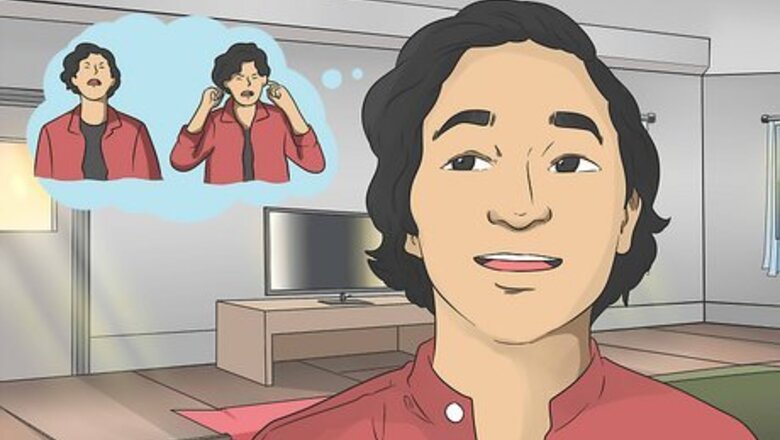
views
Tackling the Emotion
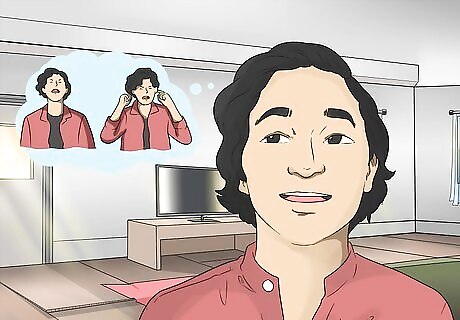
Find the root of this negative emotion. Not the cause – the root. Not why you feel this way, but why you chose to interpret this situation this way. Did you inherit this way of thinking? Was there a moment in your past you can pinpoint it to? Where does this anxiety come from? Here's a clearer example: let's say your friend Marie called you fat behind your back and now you can't stop feeling ugly and down on yourself. Some people would take this situation and be mad at Marie – so why are you feeling the way you're feeling? Acknowledging that an emotion stems from insecurity or from a previous relationship (including that with your parents) or from a particularly stressful time in our past helps us understand ourselves. When we understand ourselves, we tend to give ourselves a little more slack. Negative emotions are often associated with the unknown – when you know where it comes from, it has less power.

Know how your body is feeling. Some people will take the above step and say, "I have no idea where this emotion is coming from or why I'm feeling this way." And that's fine. If that's your answer (and even if it's not), take into account your body. Your mind sends your body signals, sure, but it works the other way around, too. Are you exhausted? Stressed out? Do your muscles ache? Are you hormonal? Did you start a new medication? Often physical issues manifest emotionally without us even realizing it. Try this: start breathing quickly and shallowly for about 15 seconds. Then hold your breath. How are you feeling? Odds are if not a little nervous, at least a little uneasy. This should show you that the next time you're feeling a negative emotion, see if some of the trigger is in your body and what you can do to make it go away.

Let it be. If someone told you to not think about a pink elephant, there's only one thing you'd wind up thinking of. It's crazy to expect otherwise from your mind. If you tell yourself that these emotions need to be fought and aren't acceptable, then sure, maybe they'll disappear for a bit, but then they'll come creeping right back. Instead of fighting them, let them be. Feel them. Stew in it. It's the only way it'll pass. Think about the last time something was on the tip of your tongue. It probably bothered you and bothered you and bothered you until you either A) remembered what it was or B) forgot about it (until now). That's just the way humans are programmed. Though it may seem a bit counter-intuitive, a surefire way to get rid of an emotion is to feel it.
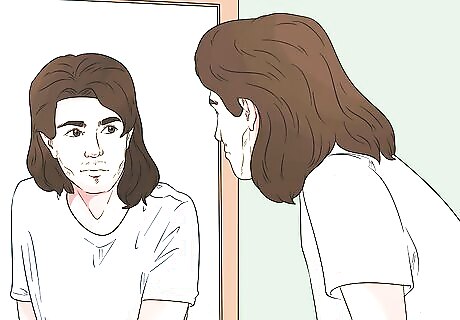
Listen and acknowledge your thoughts. It's ridiculous to tell yourself to stop thinking negative things, to stop feeling this way. That's just not how it works. Instead, take that thought, listen to it, acknowledge it, and take on a new, better thought to the end. This new and improved thought process will make the emotion a lot less jarring, more acceptable to feel, and cause you a lot less stress. For example, say that you look in the mirror and you're still feeling ugly thanks to Marie's comment. "I'll never be pretty," passes through your mind. After that, the more logical voice inside of you chimes in with a, "Okay, how true is that thought? Who would you be without that thought? And since when can you tell the future?" Opening up a dialogue can sometimes bring to light that this thought is just that – only a thought. Most of our thoughts have nothing to do with truth and everything to do with how we're feeling at that exact moment. It's just a tape running in our brains that needs to be paused.

Only live in the now. How many times have you imagined a situation going bad and it actually went as bad as you thought it would? Probably never. So all that time spent worrying about the future is for naught. When you catch yourself riddled with this negative emotion, take a step back and focus on the present. Focus on what's in front of you. The human mind is fleeting – step into the now now and that negative emotion may dissipate on its own. We've all heard "life is short," more times than we can count. And every time it's said, it's still true. Spending it feeling negative emotions is such a waste. If the world were gone tomorrow, would this thought process have gotten you anywhere? Or would it just have spoiled an otherwise good time? Sometimes when we see how ridiculous we're being, our thought processes realign themselves.
Retraining Your Brain
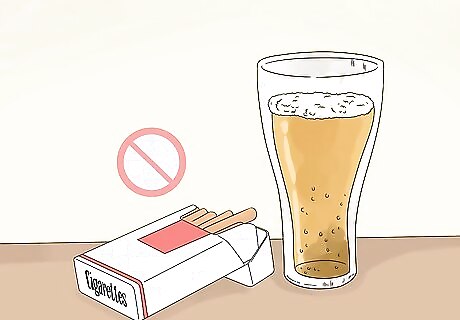
Take a look at your vices. Many people deal with their negative emotions with drinking, partying, smoking, gambling – or any combination of bad habits. They push away how they actually feel and the distress comes out in their behavior. To get at this emotion and to have it be gone forever, the vices have to go, too. They're not doing you any favors. And for others, these vices bring about the negative feelings. Drinking leads to poor choices and poor choices lead to misery and misery leads to drinking. And other times the cycle is a little less obvious, so people don't see the connection. Regardless of whether the emotion spawns the vice or the vice spawns the emotion, the habit needs to be kicked.
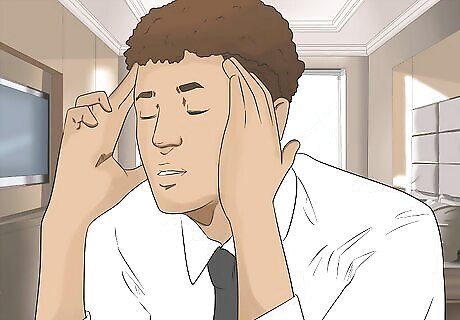
Get rid of this crutch, too. For too many of us, negative emotions are a crutch. They're rewarding. It sounds crazy, but we manage to find it comfortable. Every time someone says, "Good job!" we think in our heads – and some of us say out loud – "No, it wasn't that great." So take a step back and think about your thought patterns. How do you find this negative emotion reassuring? How is it rewarding you? For example, most of us are worriers. We over-analyze and over-analyze and over-analyze an event till we're blue in the face. We hate it, but we can't stop doing it. If we actually hated it, you'd think we'd stop, right? But we don't -- that worrying makes us feel like we're preparing. In actuality, we can't tell the future and we're no better off than we'd be without the worry. Since this step can be a little hard to take charge of, just pause for a second the next time you start to feel this emotion. Are you used to it? Is being happy or contented scary? How can you show yourself that you're getting nothing out of it?
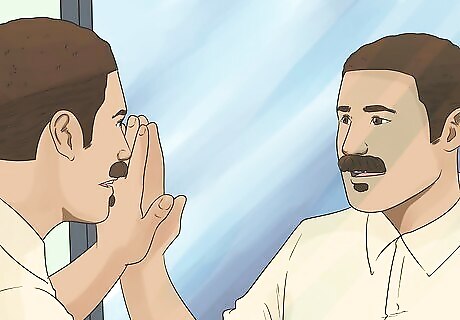
Realize that your thoughts are not you. This is the best part: you fabricate all of your thoughts. 100% of them. Sure, some of them are regurgitated things people have told you, but you're still the one doing the regurgitating. And what does this mean? It means that you're the conductor of this train and what you say goes. If you don't want to think these things, you don't have to. When you see that you and your thoughts are different, it's easier to see that these thoughts aren't necessarily true. It's easier to see that thinking you're dull and boring is different from being dull and boring. Seeing the difference lets you step outside of yourself for a wider perspective. Our thoughts are ephemeral little action potentials firing away in our neurons. They're the result of that TV show we watched last night, what we had for breakfast, and things our parents told us when we were kids. We really are running our own program. They have much more to do with our bodies, patterns, and even culture than they have to do with reality.
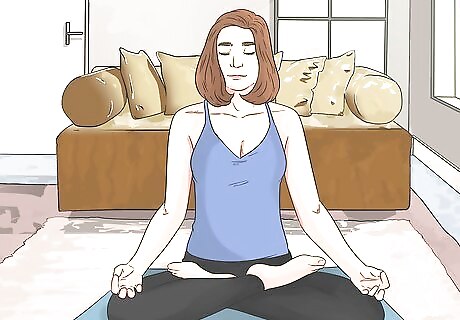
Practice mindfulness. Once you've seen that these thoughts totally lack any sense of power (after all, they're thoughts), it's time to start taking action. The first step? Practicing mindfulness. This means being aware of how you're feeling, observing your mind, and knowing how and when to bring it back when it runs astray. And it will, occasionally. To do this, try meditation. If you're not into climbing a mountain, spending days with monks, and sitting for hours cross-legged, just take 15 minutes or so out of your day, lay down, and have some well-deserve "me-time." Deep breathing exercises and yoga can be helpful, too.
Encouraging Positivity

Find an outlet. You've probably noticed a time or two when you've just been so busy, you haven't had time to even think. Well, outlets and hobbies can do that, too. Your mind gets so wrapped in what you're doing that the negative emotions kind of fall by the wayside. And to top it off, you develop a skill. This skill can make you feel more proud of yourself, content, and masterful. Did we mention yet that doing a thing you enjoy releases endorphins, making you feel happier, too? All the more reason to pick up that hobby you've been meaning to – whether it's painting, cooking, blogging, soccer, martial arts, or photography, just to name a few.

Write your negative emotions down. Even with all this positive self-talk and new hobbies you're picking up, negative emotions are bound to seep through the occasional crack or two. When that happens, some find that it's helpful to write them down. Here are a few ways to write them down and then make sure they never return: Write them on a piece of paper and then burn it. Sounds cliché, but it can be effective. And, if you'd like, take the ashes and scatter them in the wind. Buy window crayons and use them in the shower. The color runs off in the water. As you're washing yourself, you write down what's getting at you and the words disappear in the stream. You might need to do a little scrubbing after, but it's worth it. Invest in a product like a Buddha board. This is an easel that stands on top of a trough of water. You dip your paintbrush in the water, paint on the easel, and slowly the strokes evaporate.
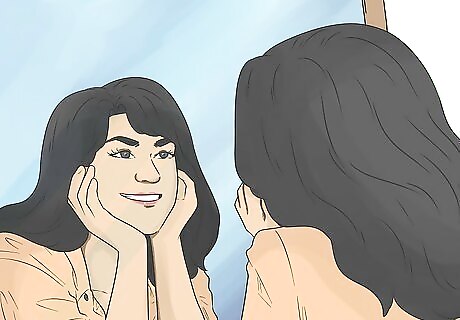
Practice self-compassion. It's not easy to change your thinking. You've been working on it for years. But you can change how you respond to these thoughts and feelings. In other words, you can relate to yourself better and show a little sympathy. It's not holding it all in that makes you strong; it's letting go. Feeling like you're weak, sad, and vulnerable is just another judgment you're passing on yourself. What's the point of that? Realize that you're human and give yourself some credit. You deserve it.

Know you're not alone. All of us have negative emotions that not only are we not proud of, but that we wish would just go away. In fact, 21 million children and adults get diagnosed with depression each year. What's more, depression is the leading cause of disability in those between the ages of 15 and 44. If negative thoughts are something that you just can't seem to get a grip on and that are taking a toll on your everyday life, it's wise to seek out help. Therapy may just be what you need. And remember: it's not that you're sick or need help – it's that you're looking to get better.




















Comments
0 comment